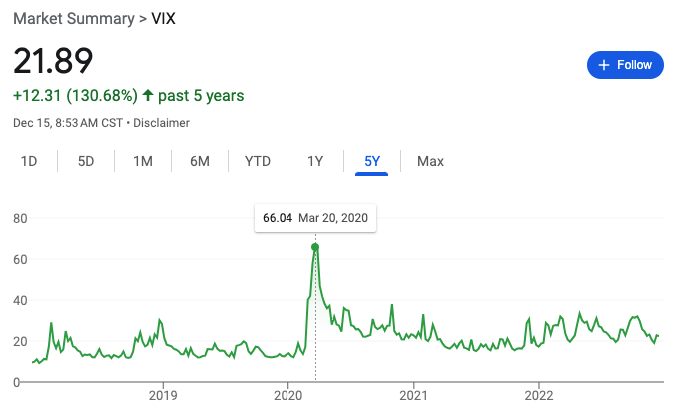The Slide Down, A 5-Part Survival Series For Entrepreneurs: Part 2 - Selling Through a Recession

Let's talk VIX. No, not the vapor rub when you have a cough. I'm talking about the index of volatility in the market. It's the ticker symbol and the popular name for the Chicago Board Options Exchange's CBOE Volatility Index (VIX), a popular measure of the stock market's expectation of volatility based on S&P 500 index options.
The higher the number, the more unstable the markets are predicted to be. The more unstable the markets, the less investor confidence. You can see in the chart below the effect that the Pandemic of 2020 had on volatility in the market. It was the largest spike by a massive margin in the last 20 years.

Currently, we are at one of the highest inflation levels in US history. Combine that with market upheaval and the fed raising rates yet again to slow inflation, and you have a recipe for a tough market to sell in.
But here is the good news: people still need what you offer. Services don't just go on pause. People are still buying homes. They still need cars, and they still need you. Entrepreneurs, if you can meet a need, you can make a sale. Sales are what make every company in the world operational. But failing to recognize the economy around you, and failing to pivot to become more engaged with prospects through sound technique, can be the difference between survival, failure, or a thriving business.
Here are three ways you can sell through volatility as an entrepreneur:
1. Get creative
Ignoring the fire in the corner of the house will result in the whole thing burning down. Don't lose a house when you could have just lost a chair. What I am saying is that smart entrepreneurs will lean into what the market needs and meet it. This doesn't mean discounting your products and services to the point you become less profitable. What CAN work though, is modifying your products and services to pivot to the market and price to it. Many business owners are using a robust platform like HubSpot Sales Hub to manage products and services with analytics to inform them what is working, and what isn't. Getting insights will not save you. Taking swift action can potentially help you not only survive, but thrive.
2. Leverage technology with your sales team
When markets are sketchy, it's time to evaluate what you are using to drive efficiencies. Let's face it - salespeople do not want a complicated process to manage prospects and instead want the shortest sales cycle possible. Evaluating your sales process front to back can alleviate bloat and drive new business opportunities. It is important to note that there are many tools on the market. Here at our agency, we have had many companies connect with us to help them grow sales. We have seen a major increase in requests to move from more expensive tools like SalesForce and move the data into HubSpot to simplify the sales process. Check out this example and you can see why so many companies are making this switch during the current market conditions.
3. Focus on ROI or savings
When a recession hits, businesses and consumers have a hyper-focus on either making money or saving money. Those two phrases should be part of your vocabulary and emphasized often. Don't get me wrong - you have to be able to deliver to succeed. But if your conversation doesn't highlight one of those two pain points, you will miss the opportunity and lose deals. Every entrepreneur faces the same challenges when it comes to driving sales, which gets magnified in a volatile economy. Using the same pain points when the outlook is good may not work when the outlook is uneasy. Solving for clients and generating an ROI or finding ways to save them money can help your sales team overcome buyer reluctance.
When you understand that buyers operate from a different place in difficult times, your company can make sales when others fold.
